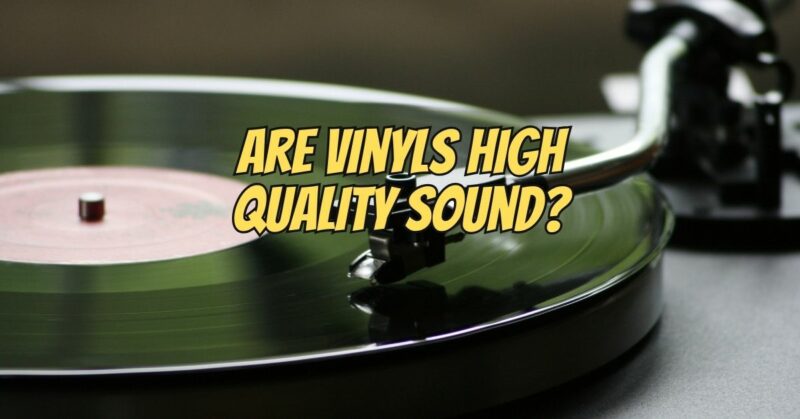Vinyl records, often appreciated for their unique sound characteristics, can offer high-quality audio when properly mastered, pressed, and played back on a well-maintained turntable setup. However, the perception of “high quality” sound is subjective, and it’s essential to understand both the strengths and limitations of vinyl as a format:
Strengths of Vinyl Sound Quality:
- Analog Warmth: Vinyl records are analog, and their sound is often described as warm, rich, and organic. Some listeners prefer the analog characteristics of vinyl, which can impart a sense of depth and musicality to the sound.
- Dynamic Range: Vinyl records can have an excellent dynamic range, allowing for greater expression and impact in the music. This means they can faithfully reproduce both quiet passages and loud crescendos.
- Soundstage and Imaging: Vinyl records are known for creating a wide and immersive soundstage with precise instrument placement (imaging). This can enhance the sense of space and realism in the music.
- Tactile Experience: Playing a vinyl record involves a tactile and interactive experience, from handling the record itself to cueing the needle and flipping sides. Some listeners find this engagement enhances their enjoyment.
Limitations of Vinyl Sound Quality:
- Surface Noise: Vinyl records are susceptible to surface noise, pops, and clicks, which can be especially noticeable during quiet passages. This noise is caused by dust, dirt, and imperfections on the vinyl’s surface.
- Wear and Tear: Repeated playback can cause physical wear on the vinyl, leading to groove wear and a gradual decline in sound quality over time. Regular cleaning and proper stylus maintenance are essential to mitigate this issue.
- Limited Frequency Response: Vinyl records have a limited frequency response compared to digital formats. The upper and lower frequency ranges may not be as extended as those of high-quality digital recordings.
- Variable Sound Quality: The sound quality of vinyl records can vary based on factors such as the quality of the pressing, mastering, and the condition of the turntable and stylus. Inconsistent quality control can lead to variations in sound across different vinyl pressings.
- Storage and Handling: Improper storage and handling can lead to physical damage, warping, and degradation of sound quality. Records should be stored vertically in a cool, dry place, away from direct sunlight and extreme temperatures.
In summary, vinyl records can provide high-quality sound characterized by their analog warmth, dynamic range, and immersive soundstage. However, they also have limitations, including susceptibility to surface noise, wear and tear, and variations in sound quality. Whether vinyl is considered high quality depends on individual preferences and the specific characteristics of sound that a listener values. It’s worth noting that “high quality” sound is a subjective concept, and different listeners may have different criteria for what they consider high fidelity or enjoyable.


